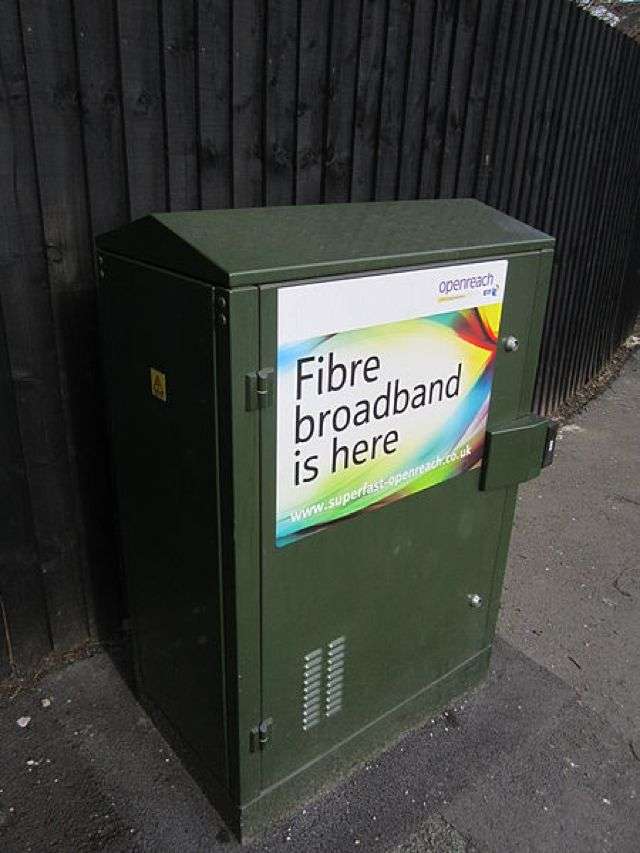Home > Broadband > News > Broadband market misleads about more than 'fibre'
Broadband market misleads about more than 'fibre'
THE Advertising Standards Authority (ASA) have launched an investigation into how "fibre broadband" services are advertised, after complaints from customers and MPs that ISPs are marketing part-copper connections as if they were fully fibre.

The review will examine just how misleading it is for providers to use exactly the same term to advertise speedier fibre-to-the-premises (FTTP) and slower fibre-to-the-cabinet (FTTC) broadband services, the latter of which connects people's homes to a network using less efficient copper cables.
However, this isn't ASA's first recent investigation into whether broadband is misleadingly sold in the UK. In November the Authority called for ISPs to stop advertising optimistic "up to" speeds, while in October they imposed new rules on how subscription fees can be presented in ads.
That they've attempted so many times to address misinformation in the broadband market isn't simply an indication of how certain ads are pushing their luck, but rather of the fundamental nature of the UK's broadband market, which is less a competitive market in any traditional sense and more an infrastructural monopoly with the semblance of competition superimposed on top of it.
Confusion
How to accelerate your internet
The Great 'Up To' Debate
Can I get lower bills for lower speeds?
This doesn't mean that ASA's intervention isn't justified or timely. Arriving at a time when a growing number of alternative networks are actually providing 100% FTTP network capable of gigabit speeds, the introduction of guidelines forbidding advertising of FTTC broadband as "fibre broadband" would ensure clarity and avoid confusion.
This is why, after resisting to do so until now, ASA have finally decided to look into the practice of advertising part-copper networks as "fibre broadband", since in the not-too distant future it may prevent customers from distinguishing FTTP services from their less sprightly FTTC counterparts.
In fact, it seems like it's already confusing a fair percentage of customers, since a survey from last year revealed that 67% of people using an Openreach FTTC connection mistakenly believe that fibre optic cable is being run directly into their homes.
Fraud?
How good is BT Infinity?
When 'fibre means fibre'
Virgin Media - are they worth it?
Finding the best fibre broadband
It's this danger MPs remarked upon in a parliamentary debate in March, when Matt Warman MP accused ISPs of committing "fraud" against their customers and declared that he wants a broadband market where "fibre means fibre".
His words may have been strong, yet it's clear that providers aren't misleading customers solely over whether or not they're selling them a full-fibre broadband connection.
As the previous ASA investigations into "up to" speeds and hidden line rental charges show, the UK broadband industry seems to have a remarkable knack for finding ways to mislead or at least confuse their clientele.
However, in contrast to Warman - who declared that "the broadband advertising market is broken" (our emphasis) - it's in fact the broadband market as a whole that's broken.
Monopoly

Source: Wikimedia Commons, Rept0n1x
For the most part, this market is dominated by BT and Openreach, who are owned by BT and who operate the underlying broadband network which many other ISPs besides BT use.
This means that, together, BT and Openreach have an 88.8% share of the broadband market in those areas of the UK where only one provider operates (such areas cover 9.5% of UK premises). Meanwhile, in those areas where more than one provider operates (covering 89.8% of the UK), the Openreach network has as much as a 73% share.
It's this dominance of the wholesale market that has, to a large extent, resulted in misleading claims and advertisements.
On the one hand, this is because BT Openreach's dominance has led to them becoming essentially responsible for providing the UK with its digital infrastructure and for meeting the political targets enshrined in the Broadband Delivery UK project.
Because they've had to roll out superfast broadband as quickly and as efficiently as possible, they've been understandably tempted to cut costs, a temptation which led them to rollout out part-fibre, part-copper connections instead of full-fibre ones.
On the other hand, because the majority of ISPs have little choice but to buy this part-copper wholesale broadband from Openreach, they can't really compete for customers in terms of the actual, underlying product they offer.
Instead, they have to compete in terms of marketing and presentation, creating the kind of advertising culture that has unsurprisingly led to small print that hides line rental charges, to exaggerated speed claims, and also to selling a part-copper network as "fibre broadband."
As such, even though Ofcom have ordered the legal separation of Openreach from BT, it's quite probable that for as long as Openreach is the dominant broadband network, providers will continue to feel a commercial pressure to stretch their advertising claims as far as possible.
And this could mean that customers remain being occasionally confused and misled for some time to come.
Get insider tips and the latest offers in our newsletter

We are independent of all of the products and services we compare.

We order our comparison tables by price or feature and never by referral revenue.

We donate at least 5% of our profits to charity, and we aim to be climate positive.
Latest News

29 December 2025
Community Fibre drops mid-contract price rises for new customers
29 December 2025
FACT warns users of illegal streaming after police investigation
23 December 2025
UK fixed broadband performance: latest Opensignal reportGet insider tips and the latest offers in our newsletter


